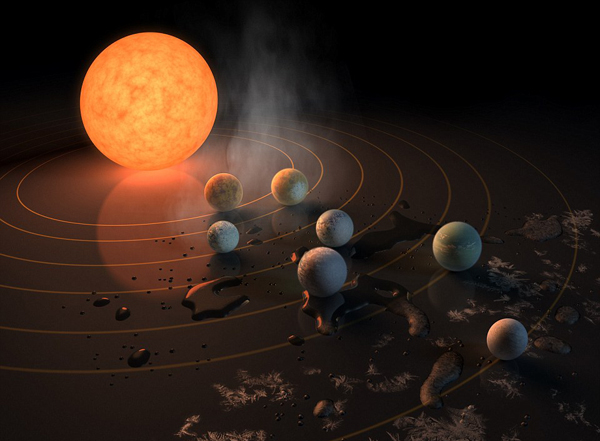NASA scientists have discovered at least seven Earth-sized planets, each potentially capable of hosting life, orbiting a nearby star just outside the solar system.
美国宇航局的科学家们发现,至少有七颗地球大小的行星围绕着太阳系外的一颗临近恒星运行,每颗行星都可能适宜生命体生存。
The exciting discovery announced Wednesday has been deemed one of the first realistic opportunities to begin a search for alien life outside our system as well as the first time so many planets were discovered circling the same star.
22日公开的发现激动人心,被视为开启探索太阳系外外星生物的首批现实机遇之一,也是人类首次发现如此多的行星环绕在同一颗恒星周围。
The cluster of planets orbit a dim dwarf star, just barely the size of Jupiter, called Trappist-1. The group of planets are about 40 light years away which isn't actually all that far away from Earth. The close proximity will allow the system to be studied in great detail, according to the release.
这群行星围绕的暗矮星和木星差不多大,被称为特拉普1号。行星与地球相距约40光年,这样的距离实际上并不算遥远。据新闻稿称,在这样靠近的距离下,人类可以对该行星系进行详细的研究。
Three of the planets or exoplanets as scientist call them, are receiving just the right amount of energy from the host star, meaning oceans of water could cover their surfaces. Scientists refer to the ideal zone just around the star as "the habitable zone," sometimes jokingly called the "Goldilocks Zone," as it is just right for supporting life.
其中三颗行星(科学家们也称之为系外行星)从恒星接受到的能量恰到好处,这意味着它们的表面可能覆盖了大面积的液态水。科学家们将该行星系恒星周围的理想地带称为“宜居地带”,由于这里正好适宜生命生存,他们有时也将其戏称为“金发美女地带”。

The other three bodies farther off from the star could feature smaller bodies of water and the seventh could even boast a puddle or two under ideal conditions.
另外三颗离恒星较远的行星表面覆盖的液态水可能较少,理想条件下第七颗行星甚至可能只有一两个水坑。
NASA's space telescope Spitzer, an infrared telescope that trails the earth as it orbits the sun, revealed the new system.
美国宇航局史匹哲天文望远镜发现了这个全新的行星系。史匹哲红外望远镜绕太阳运行,追踪地球。
"This is the most exciting result I have seen in the 14 years of Spitzer operations," said Sean Carey, manager of NASA's Spitzer Science Center at Caltech/IPAC. "Spitzer will follow up in the fall to further refine our understand of these planets so that the James Webb Space Telescope can follow up. More observations of the system are sure to reveal more secrets."
加州理工学院美国宇航局史匹哲科学中心负责人肖恩?卡雷称,“这是史匹哲运行14年以来,我看到的最令人兴奋的结果。”史匹哲将在秋季进一步完善我们对这些行星的了解,以便于詹姆斯?韦伯天文望远镜跟进。对该行星系的进一步观察必将透露出更多的奥秘。”












